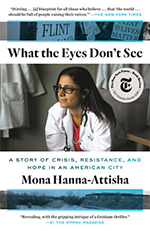 I just finished an excellent insider account of the Flint water crisis, written by the pediatrician who brought it to the attention of the wider world. Mona Hanna-Attisha practices medicine in Flint, has a background in environmental activism, and happened to be good friends with a specialist in the management of municipal water systems. An evening’s conversation between Dr. Mona (her preferred name) and her friend ends up launching her on a path to stop the poisoning of an entire city’s worth of children. She’s the right person in the right place at such a very, very wrong time. The story she tells has many levels – it’s medical and about public health, but it’s a guide to effective strategizing when faced with official government recalcitrance and obfuscation and children’s lives are on the line. Dr. Mona walks us through her decision-making and coalition-building, and the power of key individuals to solve problems or make them worse. It’s also a deeply personal story, where the background saga of the Hanna family’s emigration from Iraq to Michigan is central and relevant. This isn’t just a story of environmental chemistry; it’s a story of unions and past public health crusaders; a story of societal trends and tensions; a story of the power of a key individual to make the world a better place despite harrowing attacks by penny-pinching, racist agents of the status quo. Though written and published prior to the coronavirus pandemic, the book is timely and critical for considering our current spate of public-health challenges, and actions that will tamp down future suffering or exacerbate it. What The Eyes Don’t See is very well written, and the audiobook is perfectly read aloud by the author. Top-notch, worthy of widespread acclaim, and worth your time and attention.
I just finished an excellent insider account of the Flint water crisis, written by the pediatrician who brought it to the attention of the wider world. Mona Hanna-Attisha practices medicine in Flint, has a background in environmental activism, and happened to be good friends with a specialist in the management of municipal water systems. An evening’s conversation between Dr. Mona (her preferred name) and her friend ends up launching her on a path to stop the poisoning of an entire city’s worth of children. She’s the right person in the right place at such a very, very wrong time. The story she tells has many levels – it’s medical and about public health, but it’s a guide to effective strategizing when faced with official government recalcitrance and obfuscation and children’s lives are on the line. Dr. Mona walks us through her decision-making and coalition-building, and the power of key individuals to solve problems or make them worse. It’s also a deeply personal story, where the background saga of the Hanna family’s emigration from Iraq to Michigan is central and relevant. This isn’t just a story of environmental chemistry; it’s a story of unions and past public health crusaders; a story of societal trends and tensions; a story of the power of a key individual to make the world a better place despite harrowing attacks by penny-pinching, racist agents of the status quo. Though written and published prior to the coronavirus pandemic, the book is timely and critical for considering our current spate of public-health challenges, and actions that will tamp down future suffering or exacerbate it. What The Eyes Don’t See is very well written, and the audiobook is perfectly read aloud by the author. Top-notch, worthy of widespread acclaim, and worth your time and attention.


Thanks for the recommendation–sounds like an interesting book. Penny pinching seems to be what everything’s about today, at least pre-Covid.